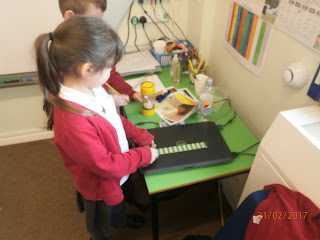Hello, welcome back! We all seem to be full of beans again and eager to do our learning, which is wonderful.
Today the children had great fun trying to figure out what the 'mystery item' was in maths. They were given this clue...
'It is longer than 21cm.'
Some children were given a second clue...
'It is shorter than 30cm'.
We had a great time exploring the lengths of different items in the classroom and our measuring skills were fab! We all remembered to line our rulers up carefully and to start at 0.
Well done everyone who made careful and accurate guesses, but a big well done to Niamh who managed to find the object! It was the train book on our bookshelf.
Maybe you could play a similar game at home and tell us all about it in snack time? Your game could have even trickier clues...






























